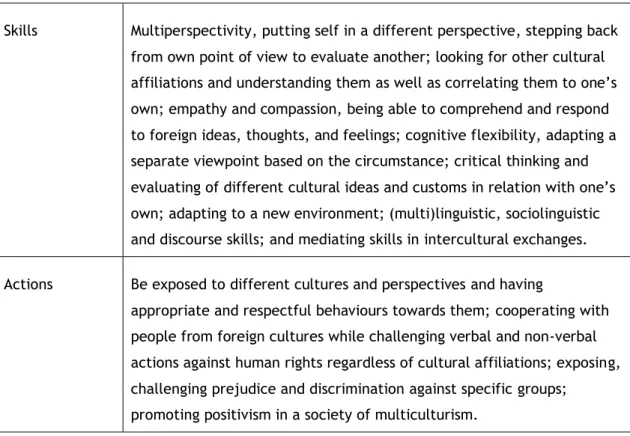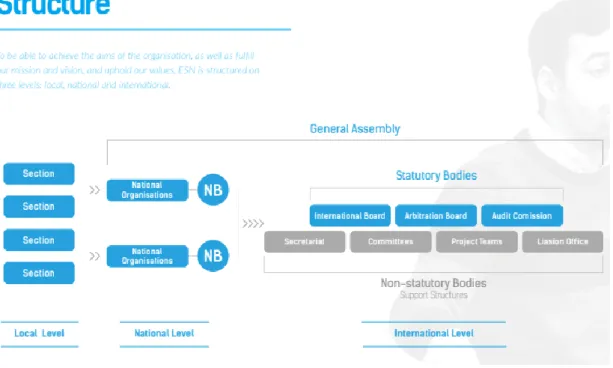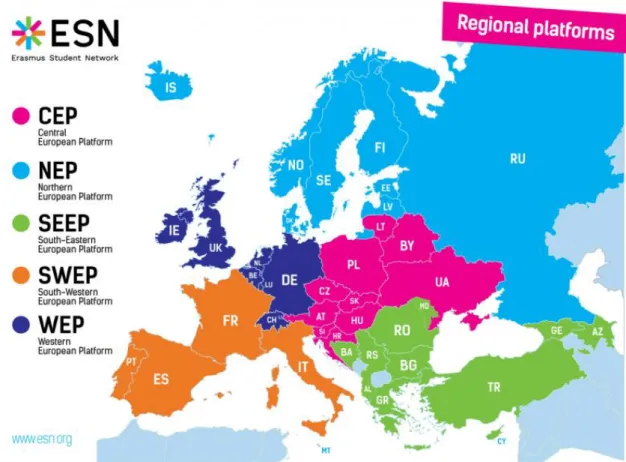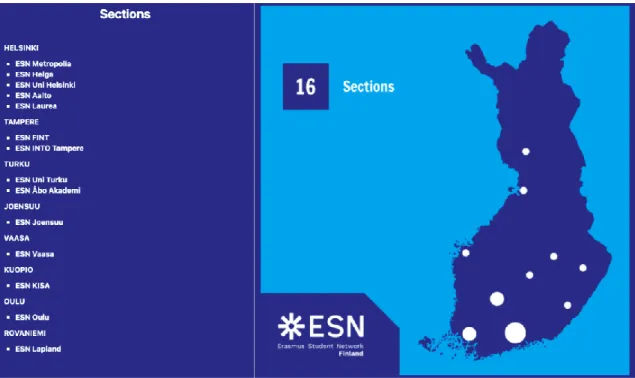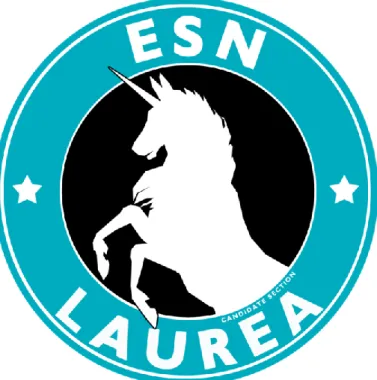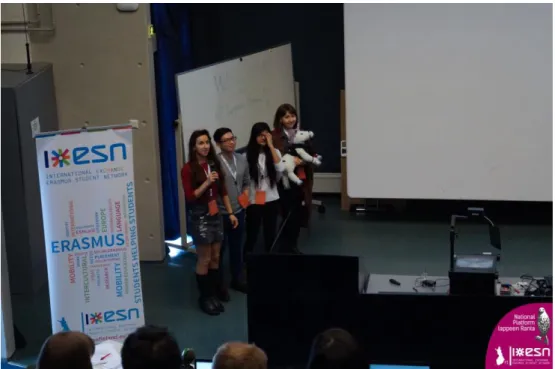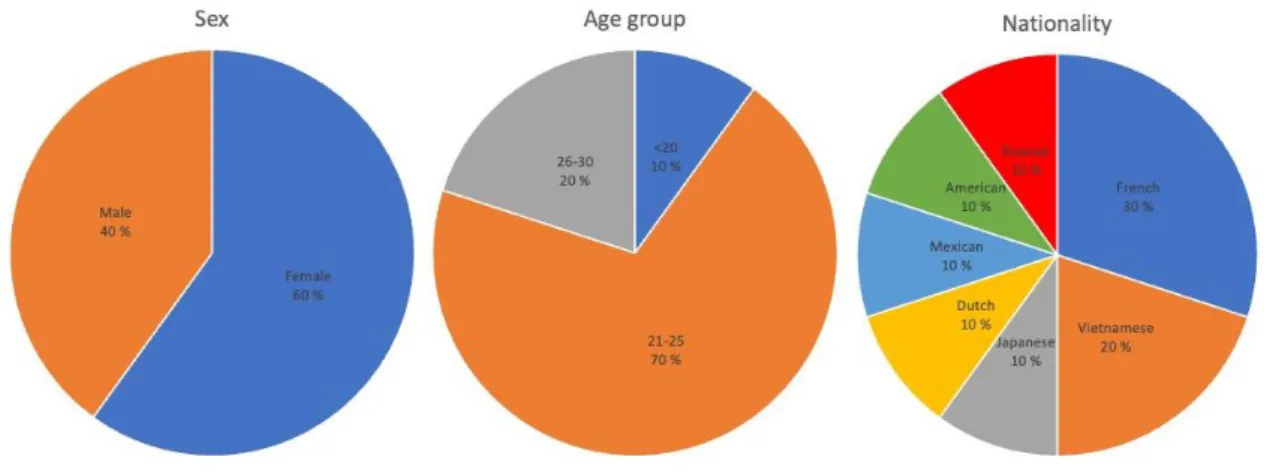The aim of this thesis was to analyze the implementation of intercultural competence in the operation and activities of ESN Laurea. It is a local chapter of the Erasmus Student Network and the youngest chapter of ESN Finland. Central to this interview was the social aspect of the participants' student careers at Laurea.
It is a local section of the Erasmus Student Network (ESN for short), and as of May 2021 the youngest section of the 16 sections of ESN Finland. The aim of the thesis was to analyze and search for the implementation of intercultural competence in the operation and activities of ESN Laurea, and its collaboration with other agencies within Laurea University of Applied Sciences. According to Berardo (2005), intercultural competence is “the ability to communicate efficiently and appropriately in different intercultural situations by successfully using one's skills.
About Erasmus Student Network
It includes the network's 534 local ESN sections, which work directly with the students by organizing events and supporting them through the process of participating in mobility programs. Depending on the size of the higher education institutions themselves, local chapters can stretch from a single college campus to an entire city. The national level of ESN consists of ESN National Organizations (NO for short), which are described as "full-fledged organizations of ESN based in EHEA countries in which there is at least one official section" (ESN Wiki 2021).
International Council, the representatives of ESN International, consisting of five volunteers who hold the positions of president, vice president, treasurer, communications manager and web project administrator. They are supported by the Audit Commission which takes charge of ESN's internal audit, and the Arbitration Board which assists in the resolution of disputes as well as document interpretation. Statutory bodies are elected during the General Assembly (GA), the highest decision-making body of ESN International, which is organized twice a year.
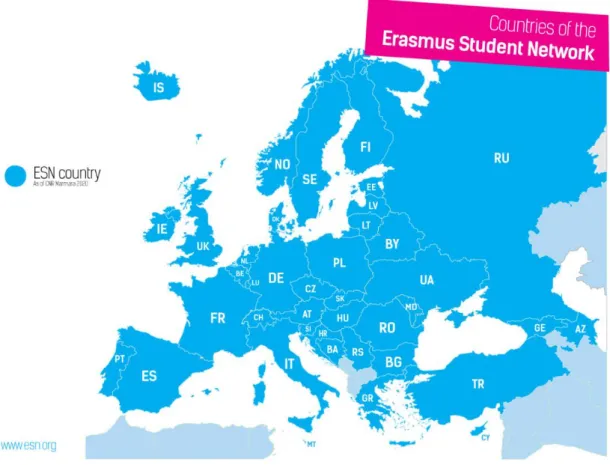
Erasmus Student Network Finland
Like many other NGOs, the structure of ESN Finland consists of the National Board, the Arbitration Board, support and working groups and local sections. It is organized twice a year in the autumn and spring seasons, in which the National Board is elected during the spring editions. The National Events Committee (NEvCo) organizes ESN Finland's national and biggest event, Pirates of the Baltic Sea (PoBS).
PoBS is a two-year student pirate ship cruise that sees more than 1,000 international students on board across the Baltic Sea to visit Stockholm, Sweden. The scale of the event has grown significantly before the COVID-19 pandemic, with the largest edition featuring international students from five countries: Finland, Estonia, Latvia, Lithuania and Poland. Another major national project of ESN Finland is FInsight, a series of educational events created to “bridge the gap between the section representatives and the national board” (ESN Finland 2016).
As of May 2021, the series spanned eight different events covering topics ranging from "interpersonal skills and wellness," "personal development and human resources" to "leading others and yourself."
ESN Laurea
Official status period
ESN Laurea has acquired a number of rights, including the freedom to use the ESN brand, tools, services and resources; to have. These rights allow ESN Laurea to establish itself as part of the Erasmus Generation, to become a recognized student organization within Laurea and to have a direct impact on the experience of Laurea's students. The author of the dissertation acted as Vice President of the Section from the beginning of its official status until January 2019, when ESN's then President and Co-Founder Laurea stepped down.
Then the author of the assignment was elected as interim president for the remainder of the mandate. After the departure of the former president, ESN Laurea continued to operate and organize activities for students and at the same time recruited new members. The thesis author continued as local president, along with the remaining co-founder, now treasurer, and three new board members who took on the role of vice president, communications.
During this mandate, ESN Laurea signed an official contract with the student union Laureamko, allowing both parties to promote, co-organize and support each other's events for a more united Laurea. A year later, ESN Laurea's board was reduced to just three for the mandate, following the departure of two former board members in the treasurer/remaining co-founder and event manager. The previous vice president was named the new president, with the thesis author stepping down to assume the roles of treasurer and local.
As the COVID-19 pandemic hit the world, ESN Laurea went on hiatus, as was the case with many other student organizations. May 2021 marked the departure of the thesis author and final original Board member, as they moved to the national level with the newly elected position of Vice President of ESN Finland. The structure of the interview, although it may vary in flexibility, is always present among experienced interviewers.
Although it is more time-consuming and requires more effort compared to qualitative research, with this method the interviewer gets an insight into the behavior, opinions and experiences of the.
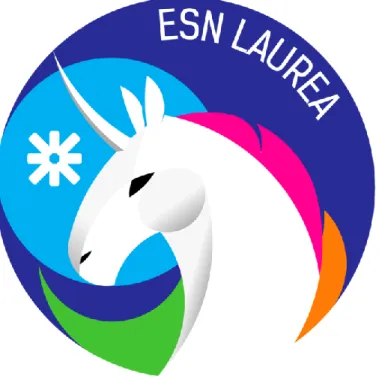
Interview implementation process
Qualitative research, unlike quantitative research, which focuses on quantities and numbers, is more descriptive and cannot be quantified. The interview does not concern the professional aspect.” The reason for this, as learned during mock.
Results
- General questions
- Overall student experience reflection
- In-depth questions
- ESN Laurea and Conclusion
An example of this is an exchange student who stated that of all the higher education institutions that had a partnership program with their home university, they were interested in Laurea because of the courses available and the appeal of the Nordic culture and lifestyle. Most of the exchange students who participated in this interview come from southern European countries, they wanted to explore northern Europe. As this is one of the thesis topics, this question was an essential introduction to the rest of the interview.
These terms are in line with the definition of intercultural competence as described in the first part of the thesis, which shows that the. All participants were familiar with Laureamko and ESN Laurea, and were able to express their thoughts and impressions, at least at the basic level, about the different responsibilities of the two organizations. In this section of the interview, more in-depth and critical questions were given to the participants.
One stated that the university relied only on student organizations for the social aspect of students, while it did not provide assistance after orientation itself. Again, there was a large difference between the responses of the exchange group versus the ladder group. As someone who was an active part of the student environment, it was really a struggle to really fight for real representation,” they stated.
With this question, it is worth noting that none of the participants completely agreed with the statement. Furthermore, 100% of the participants agreed that there were no interactions or connections with the Finnish students outside of class. Question nine was the last in the section, regarding the implementation of intercultural competence within Laurea, Laureamko and ESN Laurea from the participants' point of view.
90% of the interview participants were ESN members who joined at least one ESN Laurea activity during their studies at Laurea. While the ESN was not present in all of the participants' countries of origin, and some did not know or were not interested in the existence of an ESN in their country, one participant expressed the impact of ESN Laurea on them when they returned to their home university. Out of ten interview participants, only one person was a non-ESN member, namely a student who started studying at Laurea in 2015.
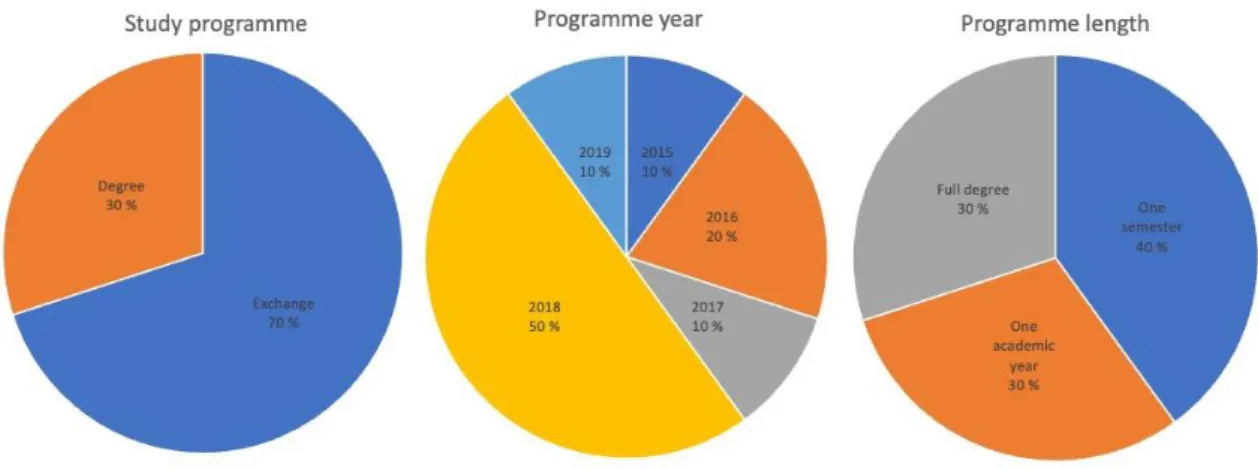
More focus on the international degree students
The opposite trend between exchange students and degree students continued, with exchange participants using the terms “exciting”, “fresh”, “best year” among others. From the results of the interview, it is safe to assume that ESN Laurea plays an. The next chapter will attempt to develop an action plan for the coming academic years as a long-term project for the organization.
Bigger push for cooperation within Laurea
Through a semi-structured qualitative interview with open-ended questions as the main research method for the thesis, the author was able to obtain data from a group of former international Laurea degrees and exchange students. The interview layout, including five parts of general questions, general reflection of student experience, in-depth questions, ESN Laurea, and conclusion and feedback, was structured to guide participants to review their full experiences as students of Laurea, touching at the same time the main topic of. During the first part, the author emphasized how important it was to include students of international degrees, with plans to make it more attractive for them to get to know and join the activity and activities of ESN Laurea.
In the second part, the focus was on the topic of cooperation between Laurea and her students. The author of the diploma thesis considered this to be an essential factor for the development of future generations of Laurea students, especially in the post-COVID period. The work of student organizations at universities is to provide the best support and.
Knowing the existing problems and finding solutions are the key activities for any organization, and this is what ESN Laurea will continue to work on for the future of Laurea and the Erasmus generation. The focus of this interview is the social aspect of the participant's student career in Laurea, with questions related to Laurea, Laureamko, ESN Laurea and their own experience during their study time at Laurea. Do you think the university should have the responsibility to improve your experience as an international student, or is it up to you.
When it comes to intercultural competence, was it well implemented/present at Laurea, Laureamko and ESN Laurea. Would you say that ESN Laurea had a positive impact on your student experience in Finland? What can ESN Laurea work on to further improve the student experience for prospective students?
